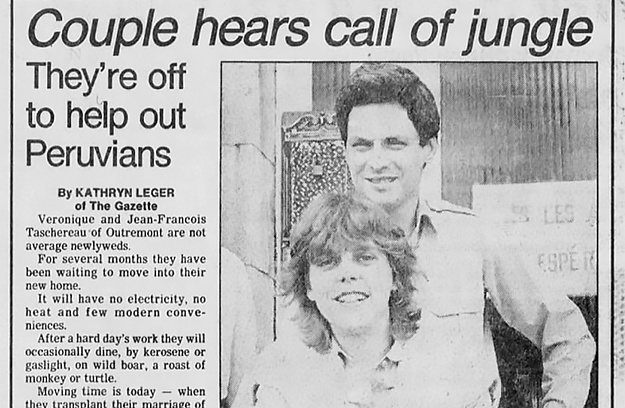Date: May 8, 1981
Location: Montreal, Canada
By: Kathryn Leger
Newspaper: The Gazette
Page: 5
They’re off to help out Peruvians
Veronique and Jean-Francois Taschereau of Outremont are not average newlyweds.
For several months they have been waiting to move into their new home.
It will have no electricity, no heat and few modern conveniences.
After a hard day’s work they will occasionally dine, by kerosene or gaslight, on wild boar, a roast of monkey or turtle.
Moving time is today – when they transplant their marriage of four months into the depths of the Peruvian jungle.
“Some people think we’re crazy,” laughed Veronique, 23, who will spend the next two years with her husband in an isolated jungle outpost helping residents make a better life for themselves.
The couple belong to a Quebec-based, non-profit organization called Wings of Hope which provides thousands of jungle inhabitants with a free emergency rescue service, radio communications, medical supplies, food and tools.
Much of the money to fund the service is raised by 10 volunteer businessmen who administer the project which helps to shrink jungle traveling time from days or months on foot to minutes or hours by air.
Often, it means the difference between life and death.
“It is fantastic work. You know you’re doing something really important,” Jean-Francois, 27, said yesterday while completing travel preparations at the Wings of Hope office on Ste. Famille St.
The flying veteran, who spent three years as a pilot for the project in Peru until 1979, will act as chief pilot. He’ll guide one of three Cessna planes to remote villages scattered over 512,000 square kilometres of jungle maze answering calls for help.
He and his wife will earn approximately $3,500 a year. Housing is provided.
“There are risks,” he admitted, “but you have to live like everyone there does.”
The possibility of contracting infectious diseases such as malaria is high “because with the heat (average 100F.) you don’t have any resistance.”
He laughed quickly as he remembered using a broom to kill the “very small, but very poisonous green snake” he found curled around his shower drain.
“It’s not as terrible as the Tarzan movies make it out to be,” commented Bruce Edwards. He and his Peruvian-born doctor-wife Elisea recently returned from a three-year stint in Satipo where the Taschereaus are headed.
“It’s extremely difficult but very rewarding,” said Edwards.
The team is also training Peruvians to become pilots, radio operators and managers. And they provide know-how for villagers to build airstrips so that their communities will be more accessible.
Wings of Hope has helped build 62 landing strips, including 20 since 1975, and install 40 radio stations.
